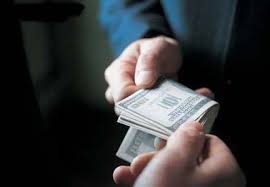
记忆方法
将“payoff”分解为两部分:“pay”和“off”。记住“pay”意味着付出,而“off”可以想象成将某物拿走。整体上,想象为“付出努力或代价后,得到了回报或好处,最终将‘好处’拿走”。这种方法通过联想帮助记忆,形成了一个简单的心理图像。
以上内容由AI生成, 仅供参考和借鉴
英语词源
- payoff (n.)
- also pay-off, 1905, "winnings from gambling," from pay (v.) + off. Meaning "graft, bribes" first attested 1930. Phrase to pay off "be profitable" is first recorded 1937.
权威例句
- 1. The ousted chairman received a £1.5 million payoff from the loss-making oil company.
- 被解职的主席从亏损的石油公司那里拿到了150万英镑的解约金。
- 2. You're doing what you really love to do, which is making music — that's the payoff.
- 你现在做着你真正喜欢做的事情,也就是音乐制作——这就是回报。
- 3. The biggest payoff epidemiologically and economically is in secondary prevention.
- 从流行病学和经济学的角度来看,最大的收益是防止疾病的继发.
- 4. Today, thousands of systems are in use primarily on economic payoff.
- 目前, 很多系统的采用主要是为了经济收益.
- 5. What kind of hired killer takes their payoff and goes to the mall?
- 什么样的雇佣杀手拿了钱会去商店 呢 ?